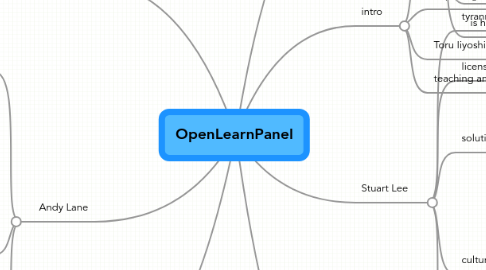
1. Diana Laurillard
1.1. software and tools
1.1.1. teachers need to act as researchers
1.1.1.1. requires support
1.1.1.1.1. london pedagogy planner
1.1.1.1.2. http://www.wle.org.uk/d4l/
1.1.1.1.3. supports learning design decision making
1.1.1.2. build on work of others
1.1.1.2.1. http://phoebe-app.conted.ox.ac.uk/
1.1.1.2.2. http://labspace.open.ac.uk/
1.1.1.3. means to experiment and reflect
1.1.1.3.1. http://www.lamsinternational.org
1.1.1.4. debate with peers
1.1.2. CSCL to enable teachers to "tinker" (JSB)
1.2. reform
1.2.1. not by governments
1.2.2. not by technology
1.2.3. by open education!
2. Andy Lane
2.1. OER value
2.1.1. availability
2.1.1.1. how many
2.1.1.2. what form
2.1.1.3. critical mass
2.1.2. accessibility
2.1.2.1. where found
2.1.2.2. by whom
2.1.3. level of use
2.1.3.1. degree of participation
2.2. implications for teaching
2.2.1. granularity of offerings
2.2.2. greater resource based learning tempered with greater interactivity
2.2.3. tuition and support separated from content
2.2.4. many versions of same content for different contexts
2.2.5. curriculum design in content rich environment
2.3. implications for learning
2.3.1. mix between
2.3.1.1. pedagogic support
2.3.1.2. self reflection
2.3.1.3. peer support
2.3.1.4. professional support
3. meta
3.1. why allow all the panelists to do mini-presentations?
3.1.1. too much talking next to each other, rather than confronting views
3.1.2. needed a brutal organiser!
3.2. felt a bit like we only got the warm-up for the conversation, and then ... time was up
4. intro
4.1. Carnegie helped build 3000 public libraries
4.2. "opening up education"
4.2.1. will be available for free as download
4.2.2. http://mitpress.mit.edu/catalog/item/default.asp?ttype=2&tid=11309
4.3. Toru Iiyoshi
4.3.1. http://www.carnegiefoundation.org/about/sub.asp?key=10&subkey=269
4.4. teaching and learning commons
4.4.1. http://commons.carnegiefoundation.org/
5. Stuart Lee
5.1. tyranny of the student information system
5.1.1. VLE pigeon-holes you as either tutor, learner or admin
5.1.2. personalization becomes barrier
5.2. license based on number of users
5.2.1. therefor restricting use
5.3. solutions
5.3.1. increased quality of tools
5.3.2. open source to remove license
5.3.3. fine-tuned control of access
5.4. cultural gates
5.4.1. much more worrying than technical ones, that will be resolved
5.4.2. increased competitiveness
5.4.3. copyrighted material in open system: people worry
5.4.4. willingness to share?
5.5. not new
5.5.1. books from 60s and 70s
5.5.2. worry that we may be doomed for failure if we don't deal with this
6. Vijay Kumar
6.1. blended learning
6.2. boundariless education
6.2.1. beyond geo-poliical
6.2.2. teacher-learner, research-learning
6.3. OCW-MIT
6.4. India Net Enabled Open Education (NO-Ed)
6.5. India Net Enabled Open Education (NEO-Ed)
6.6. iLab
6.6.1. remote access to real labs
6.7. influences
6.7.1. collectivity
6.7.1.1. social software
6.7.2. design
6.8. link between many tools and many repositories
6.9. is higher ed ready for opening up?
7. questions
7.1. what are drivers for teachers?
7.1.1. otherwise this will not have impact
7.1.2. Diana: put tools in teacher hands to enable them to tinker
7.1.3. Andy: valued, include in promotion
7.1.4. Stuart: community is others who teach same discipline
7.1.5. audience: sticks and carrots are "old school" - they're not on web2.0
7.2. think more outside of box?
7.2.1. posting audio on itunes music store
7.2.1.1. good for ego
7.3. changes relationship between learners and institutions
7.3.1. you are what you measure
7.3.1.1. how do you measure the value of all this for teachers and learners?
7.3.2. communities form around content
7.4. if we create a major university per week, we can still not deal with increasing demand
7.4.1. we need fundamentally new way to do this
7.4.2. maybe it will be more the entrepreneurs than the educators that make this happen?
